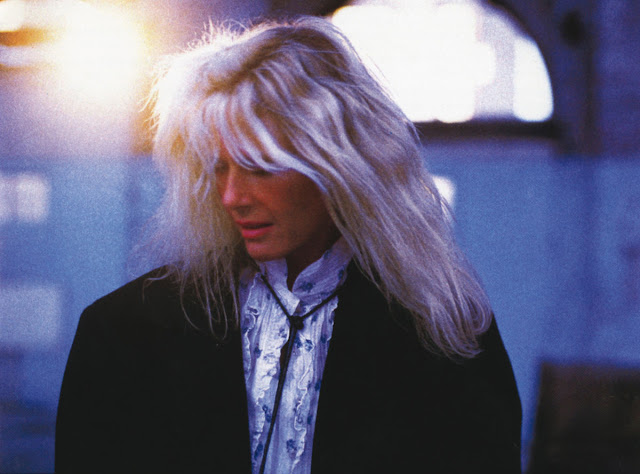Kim Carnes Feature: View from the House (1988)
LOS ANGELES – "People may have a misconception as to why I went to Nashville and what this album was going to sound like," says Kim Carnes. "It was never my intent to make a country album."
If you'd call Bruce Hornsby country, then by some stretch of the imagination you'd call this record strictly country. Acoustical-Rock-Pop-Country perhaps (for all you labeling freaks out there!) Carnes' new LP View from the House is her debut for MCA, and it is an suspicious piece of non-sequencer record-making, filled with wonderful tunes from folks like John Prine ("If you Don't Want My Love", "Speed of the Sound of Loneliness") Frankie Miller and Troy Seals ("Heartbreak Radio"), and a reqorking of the Johnny Otis standard "Willie and the Hand Jive". The tracks are played live by Carnes and a group of distinguished musicians including Leland Sklar on bass and Billy Joe Walker Jr. on guitars, and cameo appearances by (speak of the devil) Bruce Hornsby, Lyle Lovett and Steve Wariner. But the most impressive development here are Carnes' new tunes written with Donna Weiss, beautifully orchestrated and scripted pieces like "Brass & Batons" and the brilliant "Blood from the Bandit". There is definitely a new Kim Carnes, a revitalised woman who is revealing a level of writing and singing artistry that puts her in a whole new league.
Why record in Nashville? "I knew I wanted a new environment, I wanted to shake it up a little," says Carnes. "I didn't know if it would be New York or London or where. This album has to be completely live, and in L.A. now a lot of people are using the computers. When you cut live, it doesn't go under the microscope. Is the performance there or not? I felt more comfortable in Nashville."
Carnes believes the atmosphere today is good for this kind of record. "When Tracy Chapman's album happened, people began to realize there is an audience for acoustic music. I wanted this LP to sound like state-of-the-art acoustic. This record is more indicative of what my live show is like. Whenever I play live it clears up what we're doing for a lot of people."
For View from the House Carnes rejoined with old friend and first producer/publisher Jimmy Bowen. She credits Bowen and MCA Nashville executive Tony Brown with helping her take firm control over the creative vision she had for this record.
The choice of tuns on the album helps to place the record somewhere between rock, pop and country. John Prine's tunes covered by Carnes puts them in a whole new light.
"I hate categories. People are always trying to pigeon-hole you. Is this album strictly this or that? There are so many artists who defy categories."
"I'm a big fan of John Prine's. I've been waiting to do "If You Don't Want My Love" off his Bruised Orange album. I've been wanting to do it for a long time. This was the right project."
Carnes' own writing, especially with collaborator Donna Weiss on such telling songs as "Blood from the Bandit", is another compelling reason to pay attention to this album.
"'Blood from the Bandit' means we've taken and taken so much, we're even getting the last ounce of blood from the source, we're killing ourselves. Whether we're cutting down forests, or compromising anything."
Vocally, Carnes patented rasp is as emotive as ever, but this time around she let the vocals really shine in the mix.
"The only thing different about my vocals on this album is after we finished the parts we mixed it up higher. You can hear my voice for once! On past albums I was buried in the mix. That process all started when the sound of records was to have the vocal mixed back."
Carnes achieved her greatest hit with 'Bette Davis Eyes', a song that is still among the most popular singles in history, logging over two months at number-one on national music charts. However, the tune's association with her has been so strong that it at times has clouded peoples' perception of her work. It's been an uphill battle trying to move on from that milestone, despite the success of such singles as "What About Me" (with Kenny Rogers and James Ingram), and as a writer for Kenny Rogers (she wrote Rogers' Gideon album which produced the hit "Don't Fall in Love with a Dreamer"). She remains philosophical about it all.
"Just do what you do to your own standards. Because you can win. In reviews I've had of past albums people write that either it's too much like 'Bette Davis Eyes' or it's too far from it. In fact the records have nothing to do with that song."
"I would evaluate the last few years as 'cycles'. Before I was in the cycle of this album, which is a really good one, I couldn't write a song for a year – the longest dry spell I've ever had. I'm fortunate I love what I do. What gets you going is some huge change or decision to open you up. When I signed to do this kind of album on MCA, I wrote like crazy I couldn't stop."
Judging by the resulting album Kim Carnes has found the magic again. You can see it in her face and hear it in her music.
Concludes Kim Carnes, "When you're confident it's going to show."
Julius Robinson, Cash Box, August 20, 1988.



Comments
Post a Comment